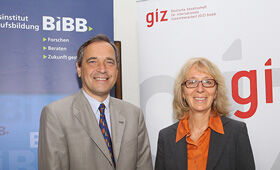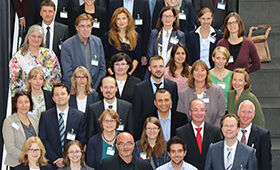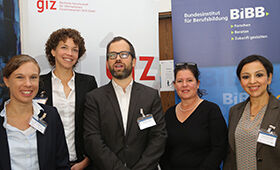10 years of quality characteristics put to a test – German VET cooperation from a single source
The five core elements of the German dual vocational education and training system are important quality characteristics in international VET cooperation. They form part of the Federal Government’s strategy to move towards greater cohesion in international vocational education and training cooperation by delivering services from a single source and have proved their worth as a reference framework.

A tried and tested approach – core elements of the German dual system of vocational education and training
The participants at a specialist conference entitled “10 years of quality characteristics tested in practice – German VET cooperation from a single source”, staged at the Siegburg City Museum on 26 and 27 September 2016, arrived at the conclusion that the five core elements of the German dual vocational education and training system are an important frame of reference for international VET cooperation which has demonstrated its practical value.
At the conference, organised by the Federal Institute for Vocational Education and Training and the German Agency for International Cooperation (GIZ), representatives of policy making, research, social partners, the education and training sector, and civil society debated aspects of German VET cooperation.
The core elements identified as successful guidelines and points of orientation in providing consultancy services to partner countries on issues relating to training and the reform of their (vocational) education systems were as follows.
- Cooperation between the state and trade and industry
- On-the-job learning
- Societal acceptance of standards
- Training of VET staff
- Institutionalised research and consultancy services
This was confirmed during the podium discussion by representatives from the German Confederation of Skilled Crafts (ZDH), the Association of German Chambers of Commerce and Industry (DIHK) and the iMOVE Division of the Federal Institute for Vocational Education and Training, the latter acting as the voice of the education and training sector.
Sustainability requires financial security
VET experts from BIBB and the GIZ reported on their project experiences in the practical implementation of the five core elements in Mexico, Egypt, Vietnam, India, Albania, Portugal, Central Asia, Slovakia, and South Africa. The challenges involved were debated, and the importance of establishing vocational education and training on a sustainable, legal and financial footing was reiterated. Only in this way can a dual training system be made viable.
Dual vocational education and training “made in Germany” – “delivery from a single source”

Professor Reinhold Weiß, BIBB's Deputy President and Director of Research, emphasised that international VET cooperation was, like an orchestra in which many different instruments play together, composed of various stakeholders. Dr. Sabine Müller, Head of the Technical and Methodological Division at the GIZ, added that this made a cohesive approach delivered from a single source even more important, especially given the rising demand for dual vocational education and training “made in Germany”. Positive mention needed to be given in this regard to the “Round Table” format of international VET cooperation, for example, which involved collaboration at regular intervals between stakeholders at state secretary, departmental and work levels.
Perspectives
Routine activities will decline in significance in many developing and emerging countries. At the same time, academisation will gather pace. In response to the question as to how learning and work processes would change in future and which challenges would emerge for initial and continuing training, Dr. Werner Eichhorst from the Institute for the Study of Labor (IZA) stated that this would create new challenges for the training system and make vocational education and training even more important.

Birgit Thomann, Head of the “Internationalisation of Vocational Education and Training/Knowledge Management” Department at BIBB, picked up on this point and, with regard to the strategic further development of international vocational education and training cooperation, stressed the timely staging of such an event, which was clearly highlighting the area of conflict between planning and implementation in international VET cooperation.
The results of the conference will be published in an edited volume.






